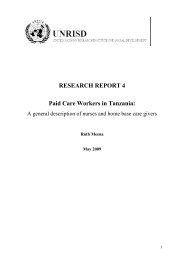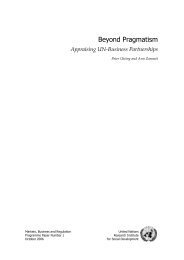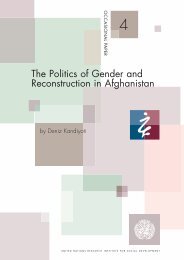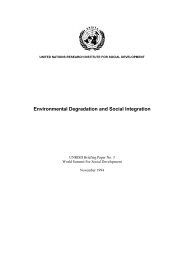Women's Employment - United Nations Research Institute for Social ...
Women's Employment - United Nations Research Institute for Social ...
Women's Employment - United Nations Research Institute for Social ...
Create successful ePaper yourself
Turn your PDF publications into a flip-book with our unique Google optimized e-Paper software.
Gender and employment in Moroccan textile industries<br />
has instilled into them the notion that it is the man who should work<br />
and meet the needs of the family. Even the Moroccan Code of Personal<br />
Status, which governs the status of women and family relations,<br />
stipulates this. The Code is based on traditional Islamic law and on<br />
the Malékite rite. It places women under male tutelage throughout<br />
their lives — celibacy, marriage, divorce, widowhood — and<br />
institutionalizes a strict division of gender roles: the man is the head<br />
of the family and is responsible <strong>for</strong> maintaining his wife and children;<br />
the woman has duties only towards her spouse or, rather, her master<br />
(Naciri, 1998:16).<br />
Table 5:<br />
Number of people in the family who are entirely dependent on the<br />
respondents, according to gender<br />
None One to three Four to eight<br />
Female 67 (34%) 83 (42%) 46 (24%)<br />
Male 17 (61%) 8 (29%) 3 (11%)<br />
Total 84 (38%) 91 (41%) 49 (22%)<br />
The wages of young women workers are important in<br />
supplementing the household budget. Families follow various<br />
survival strategies to meet their material needs. In the same family,<br />
the father might be a occasional labourer, the mother a domestic<br />
servant, the sons, street vendors and the daughters, factory workers.<br />
The above table shows that most of the women workers have at least<br />
one person <strong>for</strong> whom they are economically responsible. According<br />
to the female interviewees, in most cases, their wages constitute the<br />
largest and most stable source of income <strong>for</strong> the family. Yet the sociocultural<br />
constraints on a woman’s status still make themselves felt.<br />
Even if a young women is a source of revenue <strong>for</strong> her family she<br />
remains under the authority of her parents, who dictate her behaviour<br />
and control how her wages are spent. Nevertheless, the economic<br />
needs of families and the changes that the society is undergoing are<br />
putting a strain on this parental control. The young women who<br />
emigrate to the big towns to find work, and perhaps live on their<br />
own, are inevitably part of this change.<br />
3. Women workers and domestic responsibilities<br />
Domestic responsibilities are seen by society as inherently<br />
belonging to women, whatever paid employment they may have.<br />
69
















